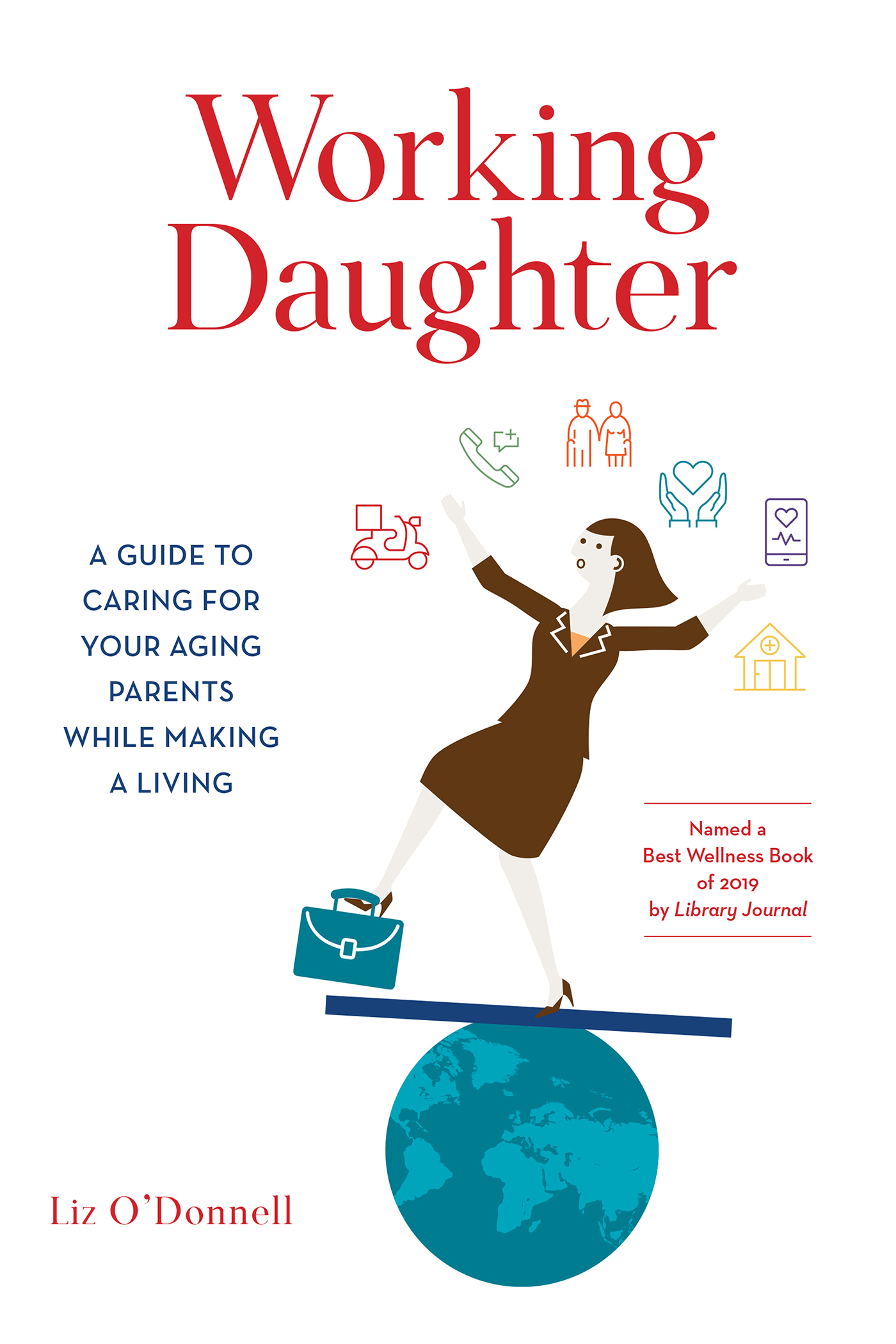Working Daughter
Working Daughter
A Guide to Caring for Your Aging
Parents While Making a Living
Liz ODonnell
ROWMAN & LITTLEFIELD
Lanham Boulder New York London
Published by Rowman & Littlefield
An imprint of The Rowman & Littlefield Publishing Group, Inc.
4501 Forbes Boulevard, Suite 200, Lanham, Maryland 20706
https://rowman.com
6 Tinworth Street, London SE11 5AL, United Kingdom
Copyright 2019 by Liz ODonnell
All rights reserved. No part of this book may be reproduced in any form or by any electronic or mechanical means, including information storage and retrieval systems, without written permission from the publisher, except by a reviewer who may quote passages in a review.
British Library Cataloguing in Publication Information Available
Library of Congress Cataloging-in-Publication Data
Includes bibliographic references and index.
ISBN 978-1-5381-2465-9 (cloth : alk. paper)
ISBN 978-1-5381-2466-6 (Electronic)
 TM The paper used in this publication meets the minimum requirements of American National Standard for Information Sciences Permanence of Paper for Printed Library Materials, ANSI/NISO Z39.48-1992.
TM The paper used in this publication meets the minimum requirements of American National Standard for Information Sciences Permanence of Paper for Printed Library Materials, ANSI/NISO Z39.48-1992.
Printed in the United States of America
To Bev
Acknowledgments
One day my father and I were visiting my mother at the hospice house where she spent her final months. My parents thanked me for helping them and wondered aloud how they could ever repay me. Well since you asked, I said, I think the least you can do is deliver me a bestseller. How about giving me your permission to share all of our dirty laundry when youre gone? They laughedand agreed. I am grateful to them for encouraging me in this and all of my endeavors.
I had to live this book before I wrote it and I am grateful to my family for their support throughout. Thank you to my sisters for being there when it really counts and for finding something to laugh about in every situation. Thank you to the ODonnells, my army of love, support, and food. And most of all thank you to Kevin, Joe, and Kate for loving me.
I also want to acknowledge the working daughters and sons who shared their experiences with me and the professionals who shared advice and insight. I met so many compassionate caregivers over the last few years and I thank them for the work they do, especially Bev, the staff and volunteers at the Stanley R. Tippett Hospice Home, and the staffs at Traditions of Dedham and Charlwell House.
I am grateful to Suzanne Staszak-Silva for sharing my vision and for the team at Rowman & Littlefield for making this book a reality. I am especially grateful to Amaryah Orenstein of Go Literaryagent, editor, coach, cheerleader, guide. Thank you.
And finally, to the members of the Working Daughter community, thank you. You lift me up every day.
Introduction
He says the best way out is always through.
And I agree to that, or in so far
As that I can see no way out but through.
Robert Frost
The only way through is through. I co-opted the phrase from Robert Frost and made it my personal mantra back when I practiced Bikram Yoga and would struggle to hold eagle pose for thirty seconds in a 105-degree room. I used the mantra outside of the studio too, when I was trying to run three miles without stopping, or when I was struggling to complete a boring assignment at work. But I didnt fully grasp the concept until I went through hell and made it out alive.
Following a disturbing phone call from my sister on Saturday, June 14, 2014, I finally plunged head first into a role I had resisted for so long: caregiver for my elderly parents. I had been assuming more and more responsibility for them over the yearsordering their groceries online, paying their bills, hiring and managing my mothers home health aides and a visiting nurse, and accompanying them to medical appointments. I didnt do these things willingly. I wanted to help, but I didnt want to be in charge. I wasnt suited for it. I resented giving up my precious little free time to deal with what often felt to me like my parents self-created problems. I lacked patience when Mum and Dad were disorganized or slow. I was judgmental, albeit silently, of their fridge with its expired foods, and of the increasing amounts of clutter in their spare bedroom. I was rude to the visiting nurses who didnt use email and the doctors who kept us waiting. I took my stresses out on my husband and it strained our relationship at times. And I resented my two sisters for not taking on as much as I did. In fact, just a week before the phone call that forced me into action, I had bristled at a text from my sister suggesting I join a caregiver support group that helps people like you. People like me? Although she was probably just trying to be helpful, I took her text to mean she didnt feel a responsibility to help.
Despite my resistance, I was always there for my parents in a crisis. Anything with a clear beginning and clear end I can handle. Contained pain I call it, and I am good at managing it. When my mother was rushed to the hospital following a seizure, I offered to take my father to the ER because I didnt want him driving under stress. I was with him when the doctor told us my mother had a brain tumor, and my sisters and I attended every subsequent meeting with the neurosurgeon. I was twenty-three at the time. Three years later, when I was living across the country and heard my fathers hand had become infected from an IV following his quadruple bypass, I called the nursing station to demand a plan and request regular updates on his progress. Eight years after that, my mother needed open-heart surgery, so I met with her surgeon, slept overnight in the SICU, and enrolled her in a cardiac rehab class post-op. When she fell and broke her nose, I picked her up out of a pool of blood, sat by her side in the ER, and moved in with her for two weeks to help her convalesce. And, a few months later, when she fell and broke her wrist but tried to hide it from me, I detected something in her voice on the phone and drove an hour and a half to meet her at the hospital.
During each crisis I would make a list of things that I should do to help my parents: hire a house cleaner, schedule appointments with specialists, look into my parents finances, increase the hours of in-home care they received, research assisted living facilities. Then, after each dramatic event, I would allow myself a few days to take a break from daughterly duties. As I resumed my own life, those days would become weeks, and the weeks would become months. Maybe it was selfish of me to let the time pass, but I was always so busy. I am married, have two school-age children, and, at the time, I was the sole breadwinner for our family. I had a high-stress career in marketing; it was more than a job to me. And I had other responsibilities too. My elderly aunt lived a few miles away and occasionally asked for my help or ended up in the hospital herself. She had no children, so my cousins and I filled in. Outside of work and family, I had interests that took up my time. I was active in local politics, serving as a Town Meeting member and on the Warrant and Finance Committee. Publishing my first book, Mogul, Mom & Maid (2013), a manifesto on balancing motherhood and career, opened up opportunities for speaking engagements. I didnt want to give up any of that. Dont I get any downtime? Why is it always me who has to help them? When do I get to have fun? Id rather spend time with my kidsI barely see them as it is. Its not fair. Its uncomfortable to admit, but thats how I felt.
Next page
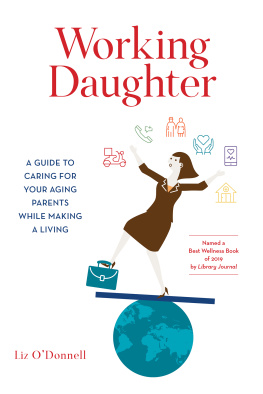

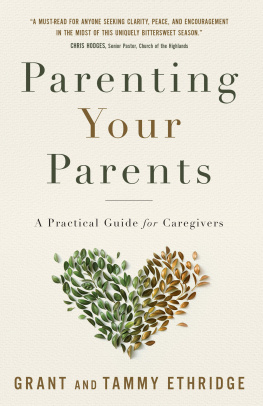
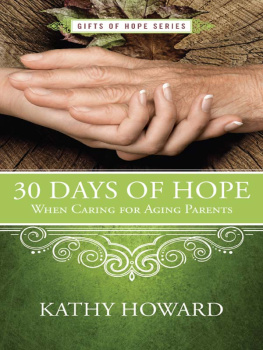
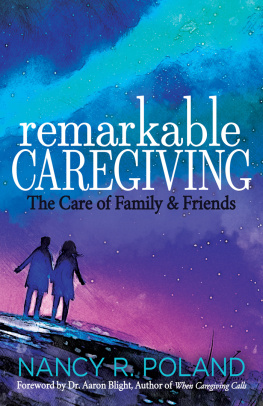
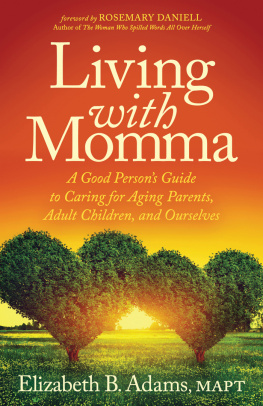
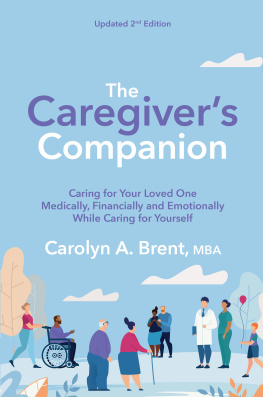
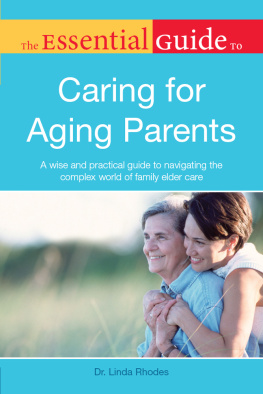
 TM The paper used in this publication meets the minimum requirements of American National Standard for Information Sciences Permanence of Paper for Printed Library Materials, ANSI/NISO Z39.48-1992.
TM The paper used in this publication meets the minimum requirements of American National Standard for Information Sciences Permanence of Paper for Printed Library Materials, ANSI/NISO Z39.48-1992.